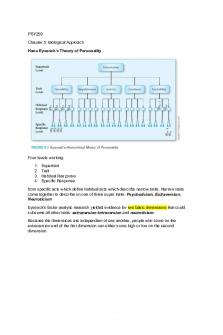PSY259 Chapter 1 - Summary of key concepts PDF

| Title | PSY259 Chapter 1 - Summary of key concepts |
|---|---|
| Author | Ying Xuan |
| Course | Personality and Individual Differences |
| Institution | Singapore University of Social Sciences |
| Pages | 2 |
| File Size | 130.4 KB |
| File Type | |
| Total Downloads | 90 |
| Total Views | 155 |
Summary
Summary of key concepts...
Description
PSY259 Chapter 1 – An Overview Of Personality And Its Research Methods Definition of Personality Personality can be defined as consistent behavior patterns and intrapersonal processes originating within the individual. 6 Approaches to Personality 1. Psychoanalytic approach Argues that people’s unconscious minds are largely responsible for important differences in their behavior styles. 2. Trait approach Identify where a person might lie along a continuum of various personality characteristics. 3. Biological approach Point to inherited predispositions and physiological processes to explain individual differences in personality. 4. Humanistic approach Identify personal responsibility and feelings of self-acceptance as the key causes of differences in personality. 5. Behavioral/social learning approach Explains consistent behavior patterns result of conditioning and expectations 6. Cognitive approach Look at differences in the way people process information to explain differences in behavior. Personality and Culture People and their personalities exist within cultural context. Individualistic cultures
Place great emphasis on individual needs and accomplishments Think themselves as independent and unique
Versus Collectivist cultures
More concerned about belonging to a larger group such as family, tribe, or nation. These people are more interested in cooperation and competition. Obtain satisfaction when the group does well rather than from individual accomplishments
Three Key Critical Assumptions/Theoretical Issues 1. Genetic v.s. Environmental influences To what extent are our personalities the result of inherited predispositions, and to what extent are they shaped by the environment in which we grow up?
2. Conscious v.s. Unconscious Determinants of Behavior To what extent are people aware of the causes of their behavior?
3. Free-will v.s. Determinism To what extent do we decide our own fate, and to what extent are our behaviors determined by forces outside our control?
Personality Assessments -> Self reports, Projective Assessments, Case studies...
Similar Free PDFs

AP Gov Chapter 1 Key Concepts
- 2 Pages

Overview of key C168 concepts
- 4 Pages

Chapter 3 summary key
- 22 Pages

Chapter 4 summary key
- 20 Pages

The Renaissance: Key Concepts
- 6 Pages

Lecture 4 Concepts Key
- 2 Pages

PSY Key Concepts
- 1 Pages

Key Evidential Concepts
- 7 Pages

PSY259 Revision Notes
- 15 Pages

Danone - Summary of key reading
- 2 Pages
Popular Institutions
- Tinajero National High School - Annex
- Politeknik Caltex Riau
- Yokohama City University
- SGT University
- University of Al-Qadisiyah
- Divine Word College of Vigan
- Techniek College Rotterdam
- Universidade de Santiago
- Universiti Teknologi MARA Cawangan Johor Kampus Pasir Gudang
- Poltekkes Kemenkes Yogyakarta
- Baguio City National High School
- Colegio san marcos
- preparatoria uno
- Centro de Bachillerato Tecnológico Industrial y de Servicios No. 107
- Dalian Maritime University
- Quang Trung Secondary School
- Colegio Tecnológico en Informática
- Corporación Regional de Educación Superior
- Grupo CEDVA
- Dar Al Uloom University
- Centro de Estudios Preuniversitarios de la Universidad Nacional de Ingeniería
- 上智大学
- Aakash International School, Nuna Majara
- San Felipe Neri Catholic School
- Kang Chiao International School - New Taipei City
- Misamis Occidental National High School
- Institución Educativa Escuela Normal Juan Ladrilleros
- Kolehiyo ng Pantukan
- Batanes State College
- Instituto Continental
- Sekolah Menengah Kejuruan Kesehatan Kaltara (Tarakan)
- Colegio de La Inmaculada Concepcion - Cebu





